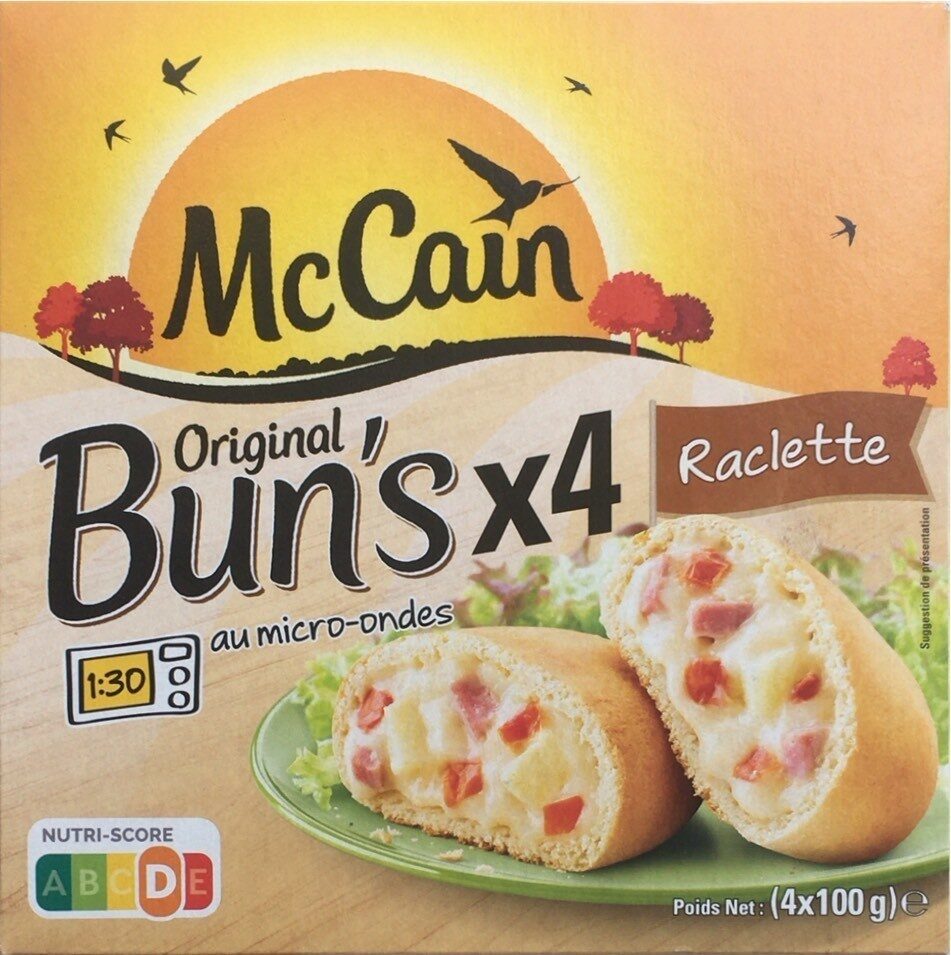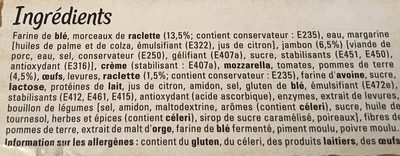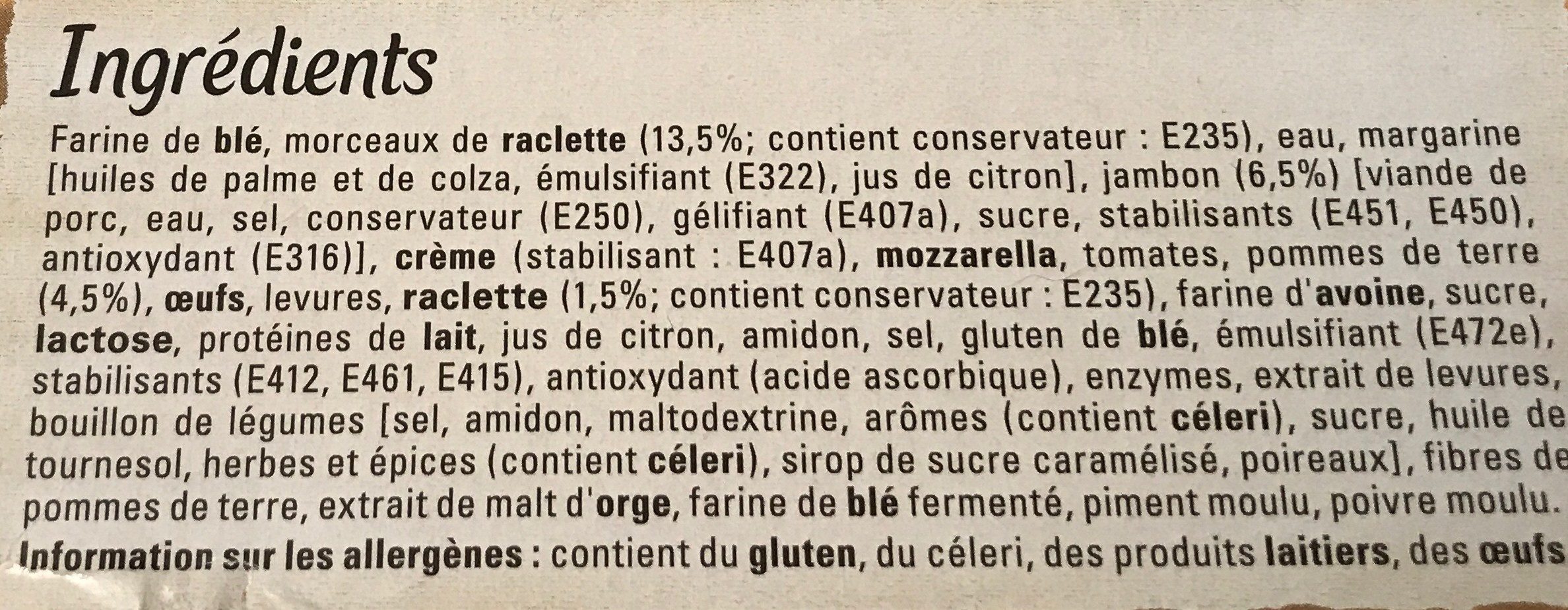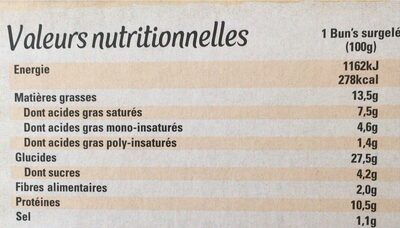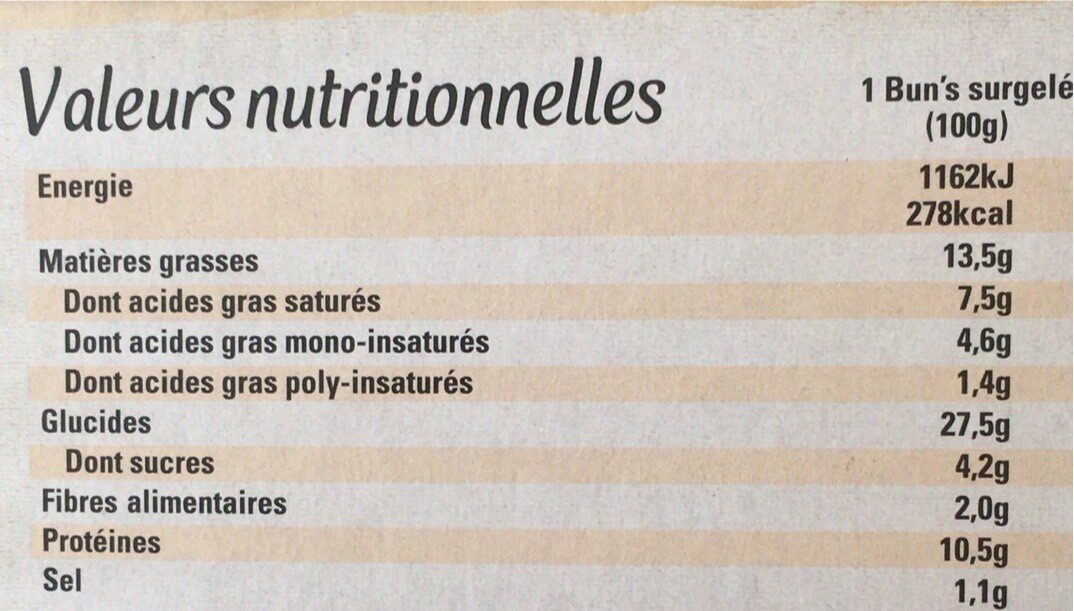Help us make food transparency the norm!
As a non-profit organization, we depend on your donations to continue informing consumers around the world about what they eat.
The food revolution starts with you!
Original Bun's Raclette - MC CAIN - 4 * 100 g
Original Bun's Raclette - MC CAIN - 4 * 100 g
This product page is not complete. You can help to complete it by editing it and adding more data from the photos we have, or by taking more photos using the app for Android or iPhone/iPad. Thank you!
×
Barcode: 8710438105797 (EAN / EAN-13)
Common name: Petits pains fourrés surgelés
Quantity: 4 * 100 g
Brands: MC CAIN
Categories: Meats and their products, Frozen foods, Meals, Meals with meat, Pork meals, Frozen ready-made meals
Labels, certifications, awards: Made in Belgium, Nutriscore
Manufacturing or processing places: Belgique
Traceability code: BE B518 EC-EG
Stores: Magasins U, carrefour.fr
Countries where sold: France
Matching with your preferences
Health
Ingredients
-
67 ingredients
: Farine de blé, morceaux de raclette (13,5%), contient conservateur : E235) (huile de palme et de colza, émulsifiant (E322), jus de citron], jambon (6,5%) [viande de porc, eau, sel, conservateur (E250), gélifiant (E407a), sucre, stabilisants (E451, E450), antioxydant (E316)], crème (stabilisant : E407a), mozzarella, tomates, pommes de terre (4,5%), oeufs, levures, raclette (1,5%, contient conservateur : E235), farine d'avoine, sucre, lactose, protéines de lait, jus de citron, amidon, sel, gluten de blé, émulsifiant ( E472e), stabilisants (E412, E461, E415), antioxydant (acide ascorbique), enzymes, extrait de levures, bouillons de légumes [ sel, amidon, maltodextrine, arômes (contient celéri), sucre, huile de tournesol, herbes et épices (contient céléri), sirop de sucre caramélisé, poireaux], fibres de pommes de terre, extrait de malt d'orge, farine de blé fermenté, piment moulu, poivre moulu.Allergens: Celery, Eggs, Gluten, Milk, fr:lysozyme
Food processing
-
Ultra processed foods
Elements that indicate the product is in the 4 - Ultra processed food and drink products group:
- Additive: E322 - Lecithins
- Additive: E407a - Processed eucheuma seaweed
- Additive: E412 - Guar gum
- Additive: E415 - Xanthan gum
- Additive: E450 - Diphosphates
- Additive: E451 - Triphosphates
- Additive: E461 - Methyl cellulose
- Additive: E472e - Mono- and diacetyltartaric acid esters of mono- and diglycerides of fatty acids
- Ingredient: Emulsifier
- Ingredient: Flavouring
- Ingredient: Gelling agent
- Ingredient: Gluten
- Ingredient: Lactose
- Ingredient: Maltodextrin
- Ingredient: Milk proteins
Food products are classified into 4 groups according to their degree of processing:
- Unprocessed or minimally processed foods
- Processed culinary ingredients
- Processed foods
- Ultra processed foods
The determination of the group is based on the category of the product and on the ingredients it contains.
Additives
-
E235 - Natamycin
Natamycin: Natamycin, also known as pimaricin, is an antifungal medication used to treat fungal infections around the eye. This includes infections of the eyelids, conjunctiva, and cornea. It is used as eyedrops. Natamycin is also used in the food industry as a preservative.Allergic reactions may occur. It is unclear if medical use during pregnancy or breastfeeding is safe. It is in the macrolide and polyene families of medications. It results in fungal death by altering the cell membrane.Natamycin was discovered in 1955 and approved for medical use in the United States in 1978. It is on the World Health Organization's List of Essential Medicines, the most effective and safe medicines needed in a health system. The wholesale cost in the developing world is between US$92.90 and 126.72 per 5-ml bottle as of 2015. It is produced by fermentation of the bacterium Streptomyces natalensis.Source: Wikipedia
-
E250 - Sodium nitrite
Sodium nitrite: Sodium nitrite is the inorganic compound with the chemical formula NaNO2. It is a white to slightly yellowish crystalline powder that is very soluble in water and is hygroscopic. It is a useful precursor to a variety of organic compounds, such as pharmaceuticals, dyes, and pesticides, but it is probably best known as a food additive to prevent botulism. It is on the World Health Organization's List of Essential Medicines, the most important medications needed in a basic health system.Nitrate or nitrite -ingested- under conditions that result in endogenous nitrosation has been classified as "probably carcinogenic to humans" by International Agency for Research on Cancer -IARC-.Source: Wikipedia
-
E316 - Sodium erythorbate
Sodium erythorbate: Sodium erythorbate -C6H7NaO6- is a food additive used predominantly in meats, poultry, and soft drinks. Chemically, it is the sodium salt of erythorbic acid. When used in processed meat such as hot dogs and beef sticks, it increases the rate at which nitrite reduces to nitric oxide, thus facilitating a faster cure and retaining the pink coloring. As an antioxidant structurally related to vitamin C, it helps improve flavor stability and prevents the formation of carcinogenic nitrosamines. When used as a food additive, its E number is E316. The use of erythorbic acid and sodium erythorbate as a food preservative has increased greatly since the U.S. Food and Drug Administration banned the use of sulfites as preservatives in foods intended to be eaten fresh -such as ingredients for fresh salads- and as food processors have responded to the fact that some people are allergic to sulfites. It can also be found in bologna, and is occasionally used in beverages, baked goods, and potato salad.Sodium erythorbate is produced from sugars derived from different sources, such as beets, sugar cane, and corn. An urban myth claims that sodium erythorbate is made from ground earthworms; however, there is no truth to the myth. It is thought that the genesis of the legend comes from the similarity of the chemical name to the words earthworm and bait.Alternative applications include the development of additives that could be utilized as anti-oxidants in general. For instance, this substance has been implemented in the development of corrosion inhibitors for metals and it has been implemented in active packaging.Sodium erythorbate is soluble in water. The pH of the aqueous solution of the sodium salt is between 5 and 6. A 10% solution, made from commercial grade sodium erythorbate, may have a pH of 7.2 to 7.9. In its dry, crystalline state it is nonreactive. But, when in solution with water it readily reacts with atmospheric oxygen and other oxidizing agents, which makes it a valuable antioxidant.Source: Wikipedia
-
E322 - Lecithins
Lecithins are natural compounds commonly used in the food industry as emulsifiers and stabilizers.
Extracted from sources like soybeans and eggs, lecithins consist of phospholipids that enhance the mixing of oil and water, ensuring smooth textures in various products like chocolates, dressings, and baked goods.
They do not present any known health risks.
-
E407a - Processed eucheuma seaweed
Carrageenan: Carrageenans or carrageenins - karr-ə-gee-nənz, from Irish carraigín, "little rock"- are a family of linear sulfated polysaccharides that are extracted from red edible seaweeds. They are widely used in the food industry, for their gelling, thickening, and stabilizing properties. Their main application is in dairy and meat products, due to their strong binding to food proteins. There are three main varieties of carrageenan, which differ in their degree of sulfation. Kappa-carrageenan has one sulfate group per disaccharide, iota-carrageenan has two, and lambda-carrageenan has three. Gelatinous extracts of the Chondrus crispus -Irish moss- seaweed have been used as food additives since approximately the fifteenth century. Carrageenan is a vegetarian and vegan alternative to gelatin in some applications or may be used to replace gelatin in confectionery.Source: Wikipedia
-
E412 - Guar gum
Guar gum (E412) is a natural food additive derived from guar beans.
This white, odorless powder is valued for its remarkable thickening and stabilizing properties, making it a common ingredient in various food products, including sauces, dressings, and ice creams.
When used in moderation, guar gum is considered safe for consumption, with no known adverse health effects.
-
E415 - Xanthan gum
Xanthan gum (E415) is a natural polysaccharide derived from fermented sugars, often used in the food industry as a thickening and stabilizing agent.
This versatile food additive enhances texture and prevents ingredient separation in a wide range of products, including salad dressings, sauces, and gluten-free baked goods.
It is considered safe for consumption even at high intake amounts.
-
E450 - Diphosphates
Diphosphates (E450) are food additives often utilized to modify the texture of products, acting as leavening agents in baking and preventing the coagulation of canned food.
These salts can stabilize whipped cream and are also found in powdered products to maintain their flow properties. They are commonly present in baked goods, processed meats, and soft drinks.
Derived from phosphoric acid, they're part of our daily phosphate intake, which often surpasses recommended levels due to the prevalence of phosphates in processed foods and drinks.
Excessive phosphate consumption is linked to health issues, such as impaired kidney function and weakened bone health. Though diphosphates are generally regarded as safe when consumed within established acceptable daily intakes, it's imperative to monitor overall phosphate consumption to maintain optimal health.
-
E451 - Triphosphates
Sodium triphosphate: Sodium triphosphate -STP-, also sodium tripolyphosphate -STPP-, or tripolyphosphate -TPP-,- is an inorganic compound with formula Na5P3O10. It is the sodium salt of the polyphosphate penta-anion, which is the conjugate base of triphosphoric acid. It is produced on a large scale as a component of many domestic and industrial products, especially detergents. Environmental problems associated with eutrophication are attributed to its widespread use.Source: Wikipedia
-
E461 - Methyl cellulose
Methyl cellulose: Methyl cellulose -or methylcellulose- is a chemical compound derived from cellulose. It is a hydrophilic white powder in pure form and dissolves in cold -but not in hot- water, forming a clear viscous solution or gel. It is sold under a variety of trade names and is used as a thickener and emulsifier in various food and cosmetic products, and also as a treatment of constipation. Like cellulose, it is not digestible, not toxic, and not an allergen.Source: Wikipedia
Ingredients analysis
-
Palm oil
Ingredients that contain palm oil: Palm oil
-
Non-vegan
Non-vegan ingredients: Raclette, Ham, Pork meat, Cream, Mozzarella, Egg, Raclette, Lactose, Milk proteins
-
Non-vegetarian
Non-vegetarian ingredients: Ham, Pork meat
-
Details of the analysis of the ingredients
: Farine de blé, raclette 13.5%, contient conservateur (e235, huile de palme), huile de colza, émulsifiant (e322), jus de citron, jambon 6.5% (viande de porc, eau, sel, conservateur (e250), gélifiant (e407a), sucre, stabilisants (e451, e450), antioxydant (e316)), crème (stabilisant (e407a)), mozzarella, tomates, pommes de terre 4.5%, oeufs, levures, raclette 1.5% (contient conservateur (e235)), farine d'avoine, sucre, lactose, protéines de lait, jus de citron, amidon, sel, gluten de blé, émulsifiant (e472e), stabilisants (e412, e461, e415), antioxydant (acide ascorbique), enzymes, extrait de levures, bouillons de légumes (sel, amidon, maltodextrine, arômes, sucre, huile de tournesol, herbes et épices, sirop de sucre caramélisé, poireaux), fibres de pommes de terre, extrait de malt d'orge, farine de blé fermenté, piment, poivre- Farine de blé -> en:wheat-flour - vegan: yes - vegetarian: yes - ciqual_proxy_food_code: 9410 - percent_min: 13.5 - percent_max: 31.5
- raclette -> en:raclette - vegan: no - vegetarian: maybe - ciqual_food_code: 12749 - percent_min: 13.5 - percent: 13.5 - percent_max: 13.5
- contient conservateur -> en:preservative - percent_min: 6.5 - percent_max: 13.5
- e235 -> en:e235 - vegan: yes - vegetarian: yes - percent_min: 3.25 - percent_max: 13.5
- huile de palme -> en:palm-oil - vegan: yes - vegetarian: yes - from_palm_oil: yes - ciqual_food_code: 16129 - percent_min: 0 - percent_max: 6.75
- huile de colza -> en:colza-oil - vegan: yes - vegetarian: yes - from_palm_oil: no - ciqual_food_code: 17130 - percent_min: 6.5 - percent_max: 13.5
- émulsifiant -> en:emulsifier - percent_min: 6.5 - percent_max: 12.9
- e322 -> en:e322 - vegan: maybe - vegetarian: maybe - percent_min: 6.5 - percent_max: 12.9
- jus de citron -> en:lemon-juice - vegan: yes - vegetarian: yes - ciqual_food_code: 2028 - percent_min: 6.5 - percent_max: 11.8333333333333
- jambon -> en:ham - vegan: no - vegetarian: no - ciqual_proxy_food_code: 28205 - percent_min: 6.5 - percent: 6.5 - percent_max: 6.5
- viande de porc -> en:pork-meat - vegan: no - vegetarian: no - ciqual_proxy_food_code: 28205 - percent_min: 0.8125 - percent_max: 6.5
- eau -> en:water - vegan: yes - vegetarian: yes - ciqual_food_code: 18066 - percent_min: 0 - percent_max: 3.25
- sel -> en:salt - vegan: yes - vegetarian: yes - ciqual_food_code: 11058 - percent_min: 0 - percent_max: 1.1
- conservateur -> en:preservative - percent_min: 0 - percent_max: 1.1
- e250 -> en:e250 - vegan: yes - vegetarian: yes - percent_min: 0 - percent_max: 1.1
- gélifiant -> en:gelling-agent - percent_min: 0 - percent_max: 1.1
- e407a -> en:e407a - vegan: yes - vegetarian: yes - percent_min: 0 - percent_max: 1.1
- sucre -> en:sugar - vegan: yes - vegetarian: yes - ciqual_proxy_food_code: 31016 - percent_min: 0 - percent_max: 1.1
- stabilisants -> en:stabiliser - percent_min: 0 - percent_max: 0.928571428571429
- e451 -> en:e451 - vegan: yes - vegetarian: yes - percent_min: 0 - percent_max: 0.928571428571429
- e450 -> en:e450 - vegan: yes - vegetarian: yes - percent_min: 0 - percent_max: 0.464285714285714
- antioxydant -> en:antioxidant - percent_min: 0 - percent_max: 0.8125
- e316 -> en:e316 - vegan: yes - vegetarian: yes - percent_min: 0 - percent_max: 0.8125
- crème -> en:cream - vegan: no - vegetarian: yes - ciqual_food_code: 19402 - percent_min: 4.5 - percent_max: 6.5
- stabilisant -> en:stabiliser - percent_min: 4.5 - percent_max: 6.5
- e407a -> en:e407a - vegan: yes - vegetarian: yes - percent_min: 4.5 - percent_max: 6.5
- stabilisant -> en:stabiliser - percent_min: 4.5 - percent_max: 6.5
- mozzarella -> en:mozzarella - vegan: no - vegetarian: maybe - ciqual_food_code: 19590 - percent_min: 4.5 - percent_max: 6.07142857142857
- tomates -> en:tomato - vegan: yes - vegetarian: yes - ciqual_food_code: 20047 - percent_min: 4.5 - percent_max: 4.75
- pommes de terre -> en:potato - vegan: yes - vegetarian: yes - ciqual_food_code: 4003 - percent_min: 4.5 - percent: 4.5 - percent_max: 3.72222222222222
- oeufs -> en:egg - vegan: no - vegetarian: yes - ciqual_food_code: 22000 - percent_min: 1.5 - percent_max: 2.9
- levures -> en:yeast - vegan: yes - vegetarian: yes - percent_min: 1.5 - percent_max: 2.5
- raclette -> en:raclette - vegan: no - vegetarian: maybe - ciqual_food_code: 12749 - percent_min: 1.5 - percent: 1.5 - percent_max: 1.5
- contient conservateur -> en:preservative - percent_min: 1.5 - percent_max: 1.5
- e235 -> en:e235 - vegan: yes - vegetarian: yes - percent_min: 1.5 - percent_max: 1.5
- contient conservateur -> en:preservative - percent_min: 1.5 - percent_max: 1.5
- farine d'avoine -> en:oat-flour - vegan: yes - vegetarian: yes - ciqual_food_code: 9310 - percent_min: 0 - percent_max: 1.5
- sucre -> en:sugar - vegan: yes - vegetarian: yes - ciqual_proxy_food_code: 31016 - percent_min: 0 - percent_max: 1.5
- lactose -> en:lactose - vegan: no - vegetarian: yes - percent_min: 0 - percent_max: 1.5
- protéines de lait -> en:milk-proteins - vegan: no - vegetarian: yes - percent_min: 0 - percent_max: 1.5
- jus de citron -> en:lemon-juice - vegan: yes - vegetarian: yes - ciqual_food_code: 2028 - percent_min: 0 - percent_max: 1.5
- amidon -> en:starch - vegan: yes - vegetarian: yes - ciqual_proxy_food_code: 9510 - percent_min: 0 - percent_max: 1.36111111111111
- sel -> en:salt - vegan: yes - vegetarian: yes - ciqual_food_code: 11058 - percent_min: 0 - percent_max: 1.1
- gluten de blé -> en:wheat-gluten - vegan: yes - vegetarian: yes - percent_min: 0 - percent_max: 1.1
- émulsifiant -> en:emulsifier - percent_min: 0 - percent_max: 1.1
- e472e -> en:e472e - vegan: maybe - vegetarian: maybe - from_palm_oil: maybe - percent_min: 0 - percent_max: 1.1
- stabilisants -> en:stabiliser - percent_min: 0 - percent_max: 1.1
- e412 -> en:e412 - vegan: yes - vegetarian: yes - percent_min: 0 - percent_max: 1.1
- e461 -> en:e461 - vegan: yes - vegetarian: yes - percent_min: 0 - percent_max: 0.55
- e415 -> en:e415 - vegan: yes - vegetarian: yes - percent_min: 0 - percent_max: 0.366666666666667
- antioxydant -> en:antioxidant - percent_min: 0 - percent_max: 1.1
- acide ascorbique -> en:e300 - vegan: yes - vegetarian: yes - percent_min: 0 - percent_max: 1.1
- enzymes -> en:enzyme - vegan: maybe - vegetarian: maybe - percent_min: 0 - percent_max: 1.1
- extrait de levures -> en:yeast-extract - vegan: yes - vegetarian: yes - percent_min: 0 - percent_max: 0.98
- bouillons de légumes -> en:vegetable-broth - percent_min: 0 - percent_max: 0.942307692307692
- sel -> en:salt - vegan: yes - vegetarian: yes - ciqual_food_code: 11058 - percent_min: 0 - percent_max: 0.942307692307692
- amidon -> en:starch - vegan: yes - vegetarian: yes - ciqual_proxy_food_code: 9510 - percent_min: 0 - percent_max: 0.55
- maltodextrine -> en:maltodextrin - vegan: yes - vegetarian: yes - percent_min: 0 - percent_max: 0.366666666666667
- arômes -> en:flavouring - vegan: maybe - vegetarian: maybe - percent_min: 0 - percent_max: 0.275
- sucre -> en:sugar - vegan: yes - vegetarian: yes - ciqual_proxy_food_code: 31016 - percent_min: 0 - percent_max: 0.22
- huile de tournesol -> en:sunflower-oil - vegan: yes - vegetarian: yes - from_palm_oil: no - ciqual_food_code: 17440 - percent_min: 0 - percent_max: 0.183333333333333
- herbes et épices -> en:herbs-and-spices - vegan: yes - vegetarian: yes - percent_min: 0 - percent_max: 0.183333333333333
- sirop de sucre caramélisé -> en:brown-sugar-syrup - vegan: yes - vegetarian: yes - percent_min: 0 - percent_max: 0.183333333333333
- poireaux -> en:leek - vegan: yes - vegetarian: yes - ciqual_food_code: 20039 - percent_min: 0 - percent_max: 0.183333333333333
- fibres de pommes de terre -> en:potato-fiber - vegan: yes - vegetarian: yes - percent_min: 0 - percent_max: 0.907407407407407
- extrait de malt d'orge -> en:barley-malt-extract - vegan: yes - vegetarian: yes - percent_min: 0 - percent_max: 0.875
- farine de blé fermenté -> en:malted-wheat-flour - vegan: yes - vegetarian: yes - ciqual_proxy_food_code: 9410 - percent_min: 0 - percent_max: 0.844827586206897
- piment -> en:chili-pepper - vegan: yes - vegetarian: yes - ciqual_food_code: 20151 - percent_min: 0 - percent_max: 0.816666666666667
- poivre -> en:pepper - vegan: yes - vegetarian: yes - percent_min: 0 - percent_max: 0.790322580645161
Nutrition
-
Poor nutritional quality
⚠ ️Warning: the amount of fruits, vegetables and nuts is not specified on the label, it was estimated from the list of ingredients: 23This product is not considered a beverage for the calculation of the Nutri-Score.
Positive points: 3
- Proteins: 5 / 5 (value: 10.5, rounded value: 10.5)
- Fiber: 3 / 5 (value: 3, rounded value: 3)
- Fruits, vegetables, nuts, and colza/walnut/olive oils: 0 / 5 (value: 23.7916666666667, rounded value: 23.8)
Negative points: 14
- Energy: 3 / 10 (value: 1163, rounded value: 1163)
- Sugars: 0 / 10 (value: 4.1999998092651, rounded value: 4.2)
- Saturated fat: 7 / 10 (value: 7.5, rounded value: 7.5)
- Sodium: 4 / 10 (value: 440, rounded value: 440)
The points for proteins are not counted because the negative points are greater or equal to 11.
Nutritional score: (14 - 3)
Nutri-Score:
-
Nutrient levels
-
Fat in moderate quantity (13.5%)
What you need to know- A high consumption of fat, especially saturated fats, can raise cholesterol, which increases the risk of heart diseases.
Recommendation: Limit the consumption of fat and saturated fat- Choose products with lower fat and saturated fat content.
-
Saturated fat in high quantity (7.5%)
What you need to know- A high consumption of fat, especially saturated fats, can raise cholesterol, which increases the risk of heart diseases.
Recommendation: Limit the consumption of fat and saturated fat- Choose products with lower fat and saturated fat content.
-
Sugars in low quantity (4.2%)
What you need to know- A high consumption of sugar can cause weight gain and tooth decay. It also augments the risk of type 2 diabetes and cardio-vascular diseases.
Recommendation: Limit the consumption of sugar and sugary drinks- Sugary drinks (such as sodas, fruit beverages, and fruit juices and nectars) should be limited as much as possible (no more than 1 glass a day).
- Choose products with lower sugar content and reduce the consumption of products with added sugars.
-
Salt in moderate quantity (1.1%)
What you need to know- A high consumption of salt (or sodium) can cause raised blood pressure, which can increase the risk of heart disease and stroke.
- Many people who have high blood pressure do not know it, as there are often no symptoms.
- Most people consume too much salt (on average 9 to 12 grams per day), around twice the recommended maximum level of intake.
Recommendation: Limit the consumption of salt and salted food- Reduce the quantity of salt used when cooking, and don't salt again at the table.
- Limit the consumption of salty snacks and choose products with lower salt content.
-
-
Nutrition facts
Nutrition facts As sold
for 100 g / 100 mlCompared to: Pork meals Energy 1,163 kj
(278 kcal)+46% Fat 13.5 g +50% Saturated fat 7.5 g +148% Monounsaturated fat 4 g Polyunsaturated fat 1 g Carbohydrates 27.5 g +71% Sugars 4.2 g +108% Fiber 3 g +79% Proteins 10.5 g +16% Salt 1.1 g -9% Fruits‚ vegetables‚ nuts and rapeseed‚ walnut and olive oils (estimate from ingredients list analysis) 23.792 % Carbon footprint from meat or fish 48.1 g
Environment
-
Eco-Score not computed - Unknown environmental impact
We could not compute the Eco-Score of this product as it is missing some data, could you help complete it?Could you add a precise product category so that we can compute the Eco-Score? Add a category
Packaging
-
Packaging with a low impact
-
Packaging parts
(Cardboard)
-
Packaging materials
Material % Packaging weight Packaging weight per 100 g of product Paper or cardboard
-
Transportation
-
Origins of ingredients
Missing origins of ingredients information
⚠ ️ The origins of the ingredients of this product are not indicated.
If they are indicated on the packaging, you can modify the product sheet and add them.
If you are the manufacturer of this product, you can send us the information with our free platform for producers.Add the origins of ingredients for this product Add the origins of ingredients for this product
Threatened species
-
Contains palm oil
Drives deforestation and threatens species such as the orangutan
Tropical forests in Asia, Africa and Latin America are destroyed to create and expand oil palm tree plantations. The deforestation contributes to climate change, and it endangers species such as the orangutan, the pigmy elephant and the Sumatran rhino.
Report a problem
-
Incomplete or incorrect information?
Category, labels, ingredients, allergens, nutritional information, photos etc.
If the information does not match the information on the packaging, please complete or correct it. Open Food Facts is a collaborative database, and every contribution is useful for all.
Data sources
Product added on by tacite
Last edit of product page on by packbot.
Product page also edited by charlesnepote, driveoff, ecoscore-impact-estimator, kiliweb, magasins-u, openfoodfacts-contributors, quechoisir, segundo, teolemon, yuka.YXE4ZE81MFl0OU5XZy9CajFRckt3ZFJGNmFHR1hHSHVCdWxOSUE9PQ, yuka.sY2b0xO6T85zoF3NwEKvlktbDevsohjvNSPnnFG6x9HVMYbEU4li3KrxKqg, yuka.sY2b0xO6T85zoF3NwEKvlmgddvHmkhSbBzXuk12wz-vWCKW5fut945nmOKs, yuka.sY2b0xO6T85zoF3NwEKvlnQdcdjloAjaLAb4g2m5loeuMpLGTshK_ZD1Kas.

